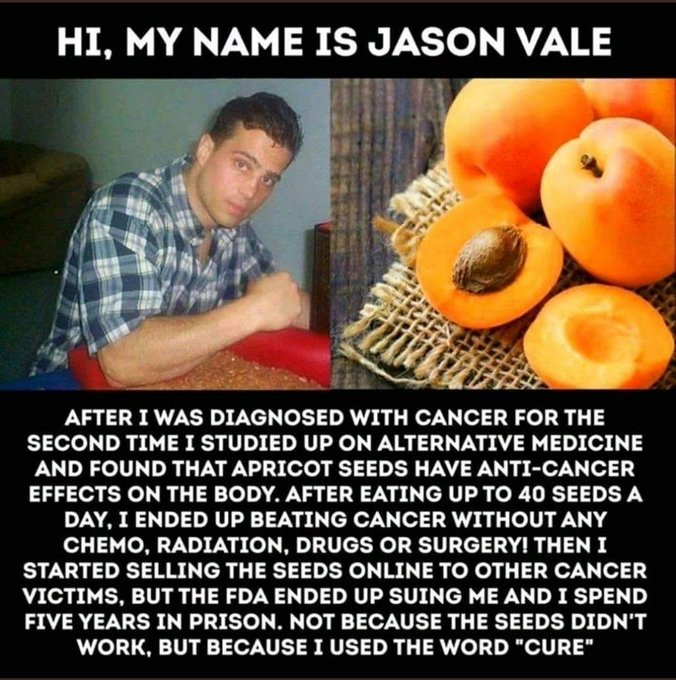“A thousand truths do not mark a man as a truth-teller, but a single lie marks him as a damned liar….Lying to other people is your business, but I tell you this: once a man gets a reputation as a liar, he might as well be struck dumb, for people do not listen to the wind.” — Robert A. Heinlein
The pervasive loss of trust in large American institutions, whether public or private, is now beyond dispute. Approximately no one reflexively trusts anything from the federal government, the news media or any so-called “expert.” Too many items of propaganda have been labeled as fact. Too many liars stand before us unrepentant.
That decline in trust would be bad enough all by itself. But it has a secondary consequence that few reckon with: the dismissal of the statements of institutions even when they’re correct.
I happened upon the following at Gab a little earlier this morning:

I hadn’t known about this fellow before. I have no idea what claims he actually made to entice customers for his apricot-pit formula. I do know that he’s no longer with us. Apparently kidney cancer got him eventually, though further specifics are unavailable.
Apricot pits contain significant amounts of amygdalin, which is toxic. Amygdalin is the chief reagent used to make Laetrile, an “alternative medicine” promoted not long ago as a cancer cure and preventative. The FDA has condemned both Jason Vale’s merchandise and Laetrile as both ineffective against cancer and harmful to the human body.
Say what you will about the Food and Drug Administration – I certainly do – but in the cases of Laetrile and amygdalin, it appears to have been correct. Yes, it’s an untrustworthy institution. Yes, it’s been caught in a number of deceptions aimed at achieving particular effects. But now and then it will be correct; it will provide useful, accurate information. The destruction of its reputation as a reliable consumer-protection agency will cause some persons to disregard those instances along with all the rest: Hey, it’s the FDA. You know how much they lie. Anything to keep the bucks coming in from Big Pharma.
There’s no gain to anyone from dismissing accurate, useful information. Indeed, there’s a loss that could extend all the way to losses of lives. Yet what are we to do with the emissions of untrustworthy institutions?
The casualties of Big, Deceitful Government include the losses that occur from this phenomenon. Yet analysts and public-policy commentators seldom address them.
If you’re a regular Gentle Reader, you know I’ve got a bee in my bonnet about the loss of our former, high-trust society. This is just one of consequences that largely goes undiscussed. Yet it matters, perhaps more than many other, more obvious deceits and betrayals. We can’t know how much it matters because its effects cannot be measured – and that may be the most poignant aspect of all.
The late Marshall Fritz, in speaking of an important rhetorical technique he called “the Randsberger Pivot,” made note of the perversity of simply attacking an institution like the FDA as untrustworthy. Done baldly, that doesn’t get your listeners thinking along with you. It gets them thinking about trichinosis, salmonella, and botulism. The FDA purports to protect us from those things…and on net balance, it does a pretty good job. What’s tragic is how the FDA’s revealed errors and deceits have caused so many to dismiss everything it says or does. The question we should be asking is how to separate the good work and the reliable results from the deceits and rent-seeking which have tarnished the FDA’s reputation.
The answer is, of course, competition: the flowering of many food-and-drug-soundness organizations, all private, all competing with one another for the public’s trust. But that subject is too large for the tail end of a tirade.
The argument for competition rests on the belief that people are likely to be wrong…. In the end, the case against an authoritarian system of resource allocation rests on the same principle as the case against an authoritarian structure in any discipline: part of the case…is that no person or body of persons is fit to be trusted with such power; the (other) part…is that no one person or group of persons can say for sure what new knowledge tomorrow will bring. Competition is a proper response to ignorance. – Brian Loasby















3 comments
Caveat emptor (let the buyer beware) supposes an informed buyer not an influenced buyer.
As long as laws don’t favor one over another, bwa ha ha ha ha, and charlatans are quickly brought to justice competition is a good thing. When laws are passed favoring one over another and the justice system is politicized true competition falters.
Evil Franklin
My best friend had breast cancer. Got it taken care of immediately. A year later it developed in the other breast. After the chemo, radiation and all the meds it was spreading. She tried the apricot approach which didn’t stop the advancement of the cancer. She died after 6 years of trying anything and everything.
“now and then it will be correct; it will provide useful, accurate information”
The old adages about stopped clocks, blind squirrels, &c might come into play here…